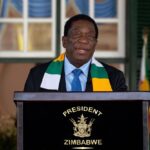President Emmerson Mnangagwa’s recent reshuffle of key security personnel, including the removal of Central Intelligence Organisation (CIO) Director-General Isaac Moyo and Police Commissioner-General Godwin Matanga, has ignited intense speculation regarding the shifting power dynamics within Zimbabwe’s political landscape.
The timing of these dismissals, coinciding with Vice President Constantino Chiwenga’s absence from the country, has further fuelled these rumours.
Despot @edmnangagwa has fired @PoliceZimbabwe Commissioner General Godwin Matanga in the absence of General Chiwenga. Matanga has I mentioned before was pro-Chiwenga. ED approved Chiwenga's family holiday in Goa, where he is with wife & children. Soko vaiti moyochena wei. pic.twitter.com/wQx54QWKxl
— Majaira Jairosi
(@MJairosi) December 20, 2024
The removal of Moyo, a figure long considered close to Mnangagwa, was not entirely unexpected within intelligence circles. Sources had predicted this move for some time, citing concerns about the unprofessional nature of their relationship and its potential impact on intelligence operations.
Months before the recent reshuffle, top intelligence sources revealed to The NewsHawks that the close ties between Mnangagwa and Moyo, described by the President himself as a familial connection (“My relationship with Mr Moyo goes deep; he calls my wife sister and I call him sekuru (uncle),” Mnangagwa stated at a memorial service), were viewed as compromising to the CIO’s work.
The rise of Faz, which played a significant role in managing the 2023 elections under Mnangagwa’s direction, further sidelined Moyo and the military, the very institution that propelled Mnangagwa to power in the 2017 coup that ousted Robert Mugabe. This shift in power dynamics reflects a deeper struggle within the ruling party, with Mnangagwa seemingly consolidating his power base independent of his initial military allies. The loss of support from senior military commanders loyal to Vice President Chiwenga has exacerbated this internal strife within Zanu-PF.
Adding to the tension is Mnangagwa’s increasingly overt campaign to extend his rule beyond the constitutionally mandated two terms, aiming for a potential stay in power beyond 2028. Intelligence sources indicate that both Moyo and Chiwenga opposed this ambition, viewing it as a significant threat to national stability and the ruling party itself.
The dismissal of Police Commissioner-General Godwin Matanga further strengthens the perception of a broader power play. The replacement of Matanga with Stephen Mutamba, described by some analysts as a “homeboy” appointment, further points towards Mnangagwa’s consolidation of power through loyalist appointments. This is a common tactic in African politics, as observed by Mziwandile Ndlovu, a research and policy analyst at the African Institute for Development Policy: “In African politics, such moves of shuffling security sector chiefs are common with heads of state trying to consolidate their hold on power.”
After the former @PoliceZimbabwe Commissioner General Godwin Matanga gave his last speech. Even those who are not body language experts can tell you all is not well. Matanga cuts a lonely figure & still does not understand why he was fired. Chiwenga is fuming, I tell you
https://t.co/l2JiZ4Mh4T
— Majaira Jairosi
(@MJairosi) January 5, 2025
Mnangagwa, currently serving his second and final term, expressed deep concern over his personal safety, particularly after a spate of security breaches involving his family which took place mid last year.
The 82-year-old president reportedly instructed the then police chief Godwin Matanga to leave no stone unturned in identifying the perpetrators, convinced that the incidents are interconnected.
“He wants answers from the security arms of the state, starting with unravelling what happened at White City,” revealed a source privy to the developments.
The White City Stadium attack, which occurred during a Zanu PF rally in 2018, sent shockwaves through the country. Two Central Intelligence Organisation (CIO) agents were killed and 47 others, including Vice President Kembo Mohadi and Defence Minister Oppah Muchinguri, were injured. The grenade, lobbed at the VIP tent as Mnangagwa exited the stage, narrowly missed the president, ricocheting off a tent mounting and changing direction, according to witnesses.
Mnangagwa, who has previously claimed to know the identity of those behind the attack, then ordered a renewed investigation, highlighting his determination to bring the perpetrators to justice. Unfortunately, this did not yield any results, until he reportedly engaged Chinese investigators to help find out who wanted to assassinate him at White City Stadium in 2018. This would then render the police chief and the CIO boss useless as they had failed to solve the mystery in over half a decade.
Prominent academic Ibbo Mandaza echoed this sentiment, stating that the removals of both Moyo and Matanga were predictable, highlighting the “homeboy affair” driving these appointments. The timing of these changes, occurring while Mnangagwa is on leave and Vice President Kembo Mohadi serves as acting president, also raises questions. The lack of official reasons given for these dismissals in the brief statement by Chief Secretary Martin Rushwaya only adds to the mystery.
The campaign to allow Mnangagwa to remain in power beyond 2028 is primarily focused in the Midlands and Masvingo provinces, areas where he enjoys strong support. The recent appointment of Lovemore Matuke, a key Mnangagwa ally, as State Security minister further underscores this consolidation of power. However, political analysts offer differing interpretations of these changes.
McDonald Lewanika suggests that the reshuffle is an attempt to maintain stability amidst intense infighting within Zanu-PF over the 2030 agenda, avoiding a major upheaval. Effie Ncube, on the other hand, warns that these changes could worsen factionalism, potentially creating further instability. The question remains whether Mnangagwa can find competent individuals to fill these critical roles without further alienating powerful factions within the party.
The appointment of Fulton Mangwanya as the new CIO Director-General is significant. Mangwanya, with a background in conservation and intelligence, brings a unique profile to the position. His nine-year tenure at ZimParks, coupled with his experience within the CIO since 1988, suggests a blend of managerial and intelligence expertise. However, his appointment also reflects the ongoing power shifts within the security apparatus.
The coinciding removal of Energy minister Edgar Moyo, replaced by July Moyo, amidst Zimbabwe’s severe electricity crisis, further emphasises the multifaceted nature of these changes. The ongoing power outages, lasting up to 20 hours a day, have crippled businesses and critical services, causing significant economic damage. While the government outlines plans to address this crisis, the impact on the already struggling economy remains substantial. The political undercurrents surrounding these changes, however, overshadow the immediate concerns of the energy crisis.
The recent dismissals of Moyo and Matanga, therefore, are not isolated incidents but rather key components of a broader power struggle within Zimbabwe’s political elite. The absence of Vice President Chiwenga adds another layer of complexity, leaving many to speculate about the future trajectory of Zimbabwean politics.












